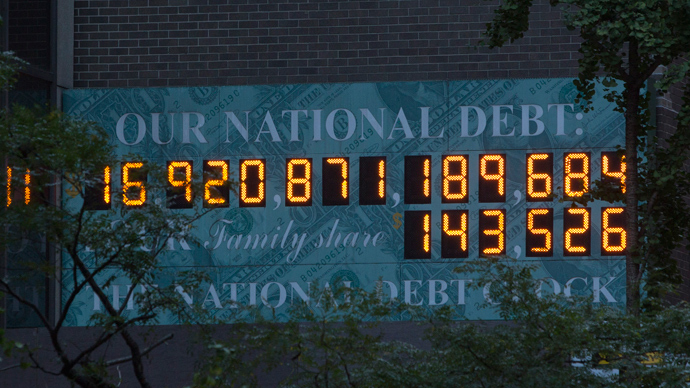US debt surges $328 billion in single day, surpassing $17 trillion for first time

Just one day after President Barack Obama signed into law a bipartisan deal to end the government shutdown and avoid default, the US debt surged a record $328 billion, the first day the government was able to borrow money.
Fasten your seatbelt, because the US debt rate is racing out of
control and nobody seems to know where or when the spending will
end: The US debt now equals $17.075 trillion, according to
figures the Treasury Department posted online on Friday.
The one-day increase of $328 billion to the US debt load smashed
the previous record of $238 billion set two years ago.
The huge leap toward what some economists fear will be eventual
insolvency was blamed on the government replenishing its supply
of "extraordinary measures," that is, the federal funds it
borrowed from over the last five months in a desperate effort to
avoid hitting the debt ceiling.
Under the law, government coffers are refilled once there is
“new debt space,” according to a report in The Washington
Times.
The Treasury Department was forced under so-called “extraordinary
measures” to borrow $400 billion beginning in May, in
anticipation of an agreement between Congress and Obama.
“Usually Congress sets a borrowing limit, or debt ceiling,
that caps the total amount the government can be in the red,”
according to the report. “But under the terms of this week's
deal, Congress set a deadline instead of a dollar cap. That means
debt will rise by as much as the government spends between now
and the Feb. 7 deadline.”
If the rate of spending continues as it has over the last five
months, US debt may eventually by as much as $700 billion before
it must apply for another increase to the debt ceiling.
Republicans, who came under intense criticism for “holding the
government hostage” by demanding an overhaul of Obama’s
healthcare legislation, eased off on their unpopular demands
without demanding any spending cuts.
On Wednesday, the Democrats and Republicans pushed through
last-minute legislation ending a 16-day government shutdown and
extending the already high debt ceiling to avert a default that
would have had serious global economic repercussions.
Standard & Poor's said on Wednesday that the partial US
government shutdown, the first in 17 years, had already trimmed
$24bn from the American economy and would reflect poorly on
economic data in the fourth quarter.












